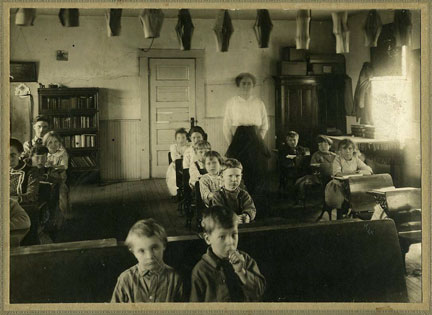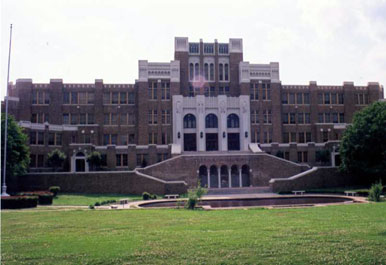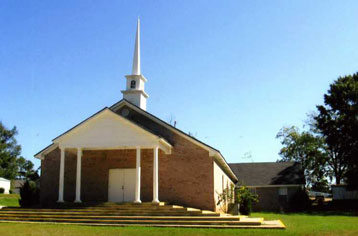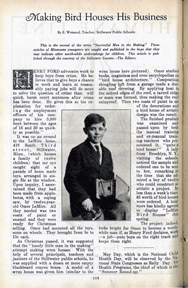
|
|
|
|
|
|
|
|
|
|
|
|||||||
|
|
|
|
|||||
|
|
|||||||
|
|
|
||||||
|
|
|||||||
|
|
|
|
|||||
|
|
|||||||
|
|
|
 |
|||||
 |
|||||||
|
Thoughts from Outside the Walls, August 2007 - February 2008Copyright Dick Bernard dick_bernard@msn.comIdea for August 2007 Two Beets...and Relationships. "...Joe said we need to be open to fundamental shifts of mind...When I asked Joe more specifically what these changes might be about, he said that it's about a shift from seeing a world made up of things to seeing a world that's open and primarily made up of relationships...." "I agree with your message [on the importance of positive relationships with the community. It's] harder to do than it looks, though." The two quotes which begin this months idea capture the essence of the perceived dilemma facing public schools and relationships: over three-fourths of taxpayers are outsiders. Developing good relationships with them is essential, but it seems impossible. Is it so difficult? A new state legislator I know recently visited a small town farmers market. The town was in her legislative district, but she was not yet well known there. At the farmers market she got in conversation with a vendor, learning the ladies name and buying two beets. A few days later the relationship was cemented a bit when the legislator saw the beet lady again, greeted her by name and asked "how are you today?" "She was delighted that I remembered her name," the legislator said. Such is the nature of building relationships. In a teeming world seemingly full of strangers, nothing trumps positive person-to-person contact. Nothing. Even the seemingly insignificant contact can make a big long-term difference, positive or negative. Examples of communications triumphs and missteps are all around every day. Here are some other recent experiences, among many: In late May, someone we knew at our church sent us two e-mails requesting help on a Saturday activity. It was an activity in which we had no particular interest, and it was sent to multiple parties. We did not respond. A few days before the event, the same person called us at home, sounding a bit desperate. I agreed to participate, and was actively involved in the activity for several hours that day. I had an unexpectedly positive experience. This single event illustrates some of the problems of present day communication: e-mails are easy to send...and easier to ignore or delete without reading. Phone calls are as easy to ignore, and can be an irritant, UNLESS the caller is someone you might know, and know fairly positively. There has to be some personal contact before the phone call to help encourage future positive action. It really helps to have actually met the person before the call. Unfortunately, the person who successfully got my commitment to volunteer half a Saturday for something I wasn't particularly interested in, never took time to follow up with a thank you in any form. Another example: more recently, I unexpectedly engaged in a brief on-line conversation with someone I'd never met, our contact initiated by a non-polarizing political question. In the course of this conversation - just a couple of e-mails each way - my correspondent related some personal feelings about three of her national elected representatives, all of whom would have great interest in her feeling favorable about them: she would vote for them or their opponent next time. One was a person of her political persuasion, the other two were not. She related the following: "... after [my husbands] relative was killed in Iraq, I e-mailed a question on a specific issue to all three of "our people." Weeks later [one's] office left half of a voice mail message on our answering machine. [The second] office finally sent a letter - on a different issue." The third, who happened to be the one she liked least, "promptly had mailed a detailed answer," she said. You can guess which of the legislators my correspondent felt most positive about. People remember the little things. These vignettes are all simple examples of effectively (and ineffectively) inviting someone into a relationship. In the Iraq question scenario, the legislator whose staff followed up appropriately reaped positive political capital simply answering a question. The constituent, in turn, has spread the story about good constituent relations. Things like this do tend to have a cumulative effect, for good or ill. The business of public schools and their outside the walls constituents has to be, constantly, relationship-relationship-relationship. All else pales in comparison. Every school employee has to be made aware of, and taught to practice simple positive personal relationships in each and every contact. One never knows which of those contacts will be the one that makes the difference. A final thought: As I was writing this it occurred to me that every one of these basic conversation examples involved women, plus some others that didn't 'make the cut.' I talk to lots of men, too, but basic communication does not come up as often, if at all, with them. Is there a message here too? Best I know, school administration is still largely a male domain...maybe I'm talking about a positive female 'side' that doesn't get sufficient play in public schools.... Just a thought. Have a great year. The Quotations: The first is by Peter Senge, about a conversation with Joseph Jaworsky, recounted in Senge's Introduction to Jaworsky's excellent book, "Synchronicity, the Inner Path of Leadership"). Barrett-Koehler Publishers, 1996. The second is from the legislator who won the easily earned positive impression from the "beet lady."  Class in country school near Farmington MN 1915 American Education Week November 11-17, 2007 Great Public Schools: A Basic Right and Our Responsibility www.nea.org/aew/index.html Idea for September 2007  This and photo at the end are of the bridge collapse August 1, 2007, and by an unknown photographer. and Visioning Beyond the Next Quarter August 1 the metropolitan area in which I live made international news of an unwanted kind: one of our most heavily traveled bridges collapsed into the Mississippi River, killing thirteen. The death toll was remarkably low, given the potential disaster. It was said that over 80 vehicles were on the bridge at the time it collapsed, including a school bus with over 50 children on board. A collapse five or ten seconds earlier... On August 31 the front page of both major papers here had essentially identical headlines, top right front page: "Hundreds more public schools fall short," one said. The other, "Schools struggle to hit state marks". The better part of six pages of newsprint was used to talk about this failure. While I'm a very strong supporter of public schools, I admit I was drawn past the words of explanation to the list of failing schools to see if any of my districts schools were on it. There were. Six of them. No context. In between, a report came that about one-fourth of my states school districts will be going to the voters for money this fall; talking points came through the e-network on how to respond to the test scores; a workshop was held on strategies to pass the levy referendums; my national teacher union magazine had six pages on "Parents in the Picture" about building better relationships with parents (it was the cover story with nary a word relating to outsiders like me). In the mail came the Annual Report for another national organization I belong to, highlighting the "significant role" the organization had played in an inaugural national "Education Summit" where "many of the nation's most prominent education leaders" met "to help shape a collective direction for public schools." And while I was working as a volunteer in a State Fair booth on August 27, a senior citizen came up to me to complain about taxes. Paying for the new bridge was the subtext of her complaint. "They need to cut [government] waste. Teachers only work 8 months a year, and still want a raise," she said, angrily. Okaaaay. With that bridge, I thought, almost certainly people in a position to know had taken risks to quiet people like her who were anti-taxes. Needed action was deferred. (The bridge which collapsed was not scheduled to be replaced till 2020.)* These were just some of the things I saw and heard as an ordinary person who still tries to stay connected with public education. It occurred to me, watching the news management of both the bridge collapse and the test score reports, and thinking about the assorted intervening (and far less visible to the general public) communications I'd received, that there were common threads. 1) Institutions, public and private, are well versed in and prepared for crises, and crisis communication generally. Managers know that these might happen, and seem pretty well prepared to respond to the public about them, from damage control to self-congratulatory. "Spin" rules. 2) There is much attention given to the short term and immediate: a bridge needs to be replaced (and probably will be within a year); test scores need to improve by next year (or else); referendum campaigns need to be marshaled and hopefully successfully concluded in a period of a few months (at most). "Armies" are mobilized for each, then de-commissioned. 3) People at the top of all hierarchies, "The Summit," meet regularly, assess data, and talk seriously about the future. BUT the conversation tends to take place only at the top, usually only amongst 'birds of a feather' and the results trickle down to some base, hopefully accepted at face value, rather than percolating up from that same base. Thus, the base seldom owns the conversation, and lack of ownership is a problem. 4) What appears to be missing is a serious and ongoing look at the long-term truly involving the minds and hearts of the people at the base of the system, even though the need for public engagement has long been known. I wonder how many districts even think of actively engaging people like myself in ongoing and truly future oriented think tanks of other than 'experts', so that we can become more aware of the implications of often short-term and financially based decision making. The six-year old who started first grade this September may be graduating from college 16 years from now, when I'm elderly and possibly dependent on society. It should make a real difference to me, who will depend on that first grader, that I need to be willing to invest now in his or her success. But I can't be convinced of this, unless there is ongoing conversation of which I am part. Public engagement is hard work, granted, and requires change. But hard work, if undone, has terrible implications, not only for that first grader, but for me and the cohort of which I am part. It has to go beyond the usual people and the usual venues. Future thinking as a community activity needs to be as much a part of the school planning program, as crisis communications, achievement of short-term goals, or Think Tanks at the highest levels. Have a great year. * - The text above was complete before I read the newspaper on September 6, 2007. The probability for any kind of visionary long term solutions for bridge and transportation problems are evaporating at both state and national level. The system is back to business as usual, short-term bandaid and bluster, until the next disaster. It's the politically expedient thing to do: pretend to do something, then do nothing. 

Little Rock Central High School, May 8, 2007. Fifty years ago, September, 1957, Central High School became the symbol of the conflict around school desegregation. Today, as then, the building is an imposing place. Change came hard to Little Rock and other places, and more change is still needed, but the student body at Little Rock Central High School more reflects the total community than it did fifty years ago. On October 23, in this tidy church in Lexington, Mississippi, 100 or more Holmes County citizens will gather to have a community conversation about public education, specifically, public education in their communities.  I have no doubt whatever that the conversation will be a success. Probably the only worry is that more people will show up for the conversation than the church can accommodate. I hope for the organizers sake that the perfect number of people show up for the conversation, so that the moderators for groups of 10 can have the most productive conversations possible, identifying both problems and solutions in their school district. I hope, also, that the moderators and reporters will confront the problems as possibilities and challenges rather than as blocks. The conversation will be moderated and attended by ordinary members of the community. The issues addressed will not be high-minded philosophical matters; rather than the basics of relationships between school, parent, child and community. Three of us were in Lexington on October 13, to give the moderators a first walk-through of how to do a conversation in their town. The materials, prepared through the Public Engagement Project/Family School Community Partnership section of the National Education Association, were very well done - a how-to script for doing the perfect job on 'game day' - the conversation itself. But scripts are only scripts: I noted to the group about mid-way through the session that they might best consider the materials as being something like a script for a play which they were reading for the first time. It takes practice to get the script down pat. With ten days to 'kickoff', I have no doubt that the newly trained moderators will do a very productive conversation. Hopefully, they'll incorporate the three F's of a successful gathering into their activity: Food, Fun, Family...there was great food and family at our practice session; we were too rushed to do the fun part, or maybe we just didn't keep it in mind beforehand! Something Fun is important - doesn't have to be any big thing, either. After an enriching (and exhausting) day in training, we three trainers debriefed, and then I spent a relaxed day (fun) looking around "the Magnolia State". On the flight home, I settled into continuing my reading of the outstanding 1996 book," Synchronicity: The Inner Path of Leadership" by Joseph Jaworski. A paragraph in that book, at page 110, caught my attention, in that it focused a spotlight on how we communicate (and mis-communicate) in this society of ours. Jaworski said this: "the word 'dialogue' as used by [David] Bohm, comes from two Greek roots, dia and logos, suggesting 'meaning flowing through.' This stands in stark contrast to the word 'debate', which means 'to beat down,' or even 'discussion,' which has the same root as 'percussion' and 'concussion' - 'to break things up'." As it happened, just before leaving home for Mississippi, I'd been actively engaged in the aftermath of a very major conflict over alleged suppression of freedom of speech. A local University President had denied a very prominent person the right to speak on his campus, and after an uproar, changed his mind, and called for a much-needed "forum" to surface and talk about the issues which had arisen during the conflict. In his brief statement proposing the forum, he had used the very different words 'dialogue', 'debate' and 'discuss' as though they were interchangeable and synonymous. They aren't. What those fine people in Holmes County MS will be engaging in on October 23 is called a 'Community Conversation.' I looked the words up in my big unabridged dictionary, looking for definitions fitting what Holmes County will experience October 23: Community: "from communis, common...2. A society of people having common rights and privileges, or common interests, civil, political, etc., or living under the same laws and regulations: as a community of farmers 3. Society at large: the public or people in general...." Conversation: "from conversatio, intercourse, conversation...5. A talking together; informal or familiar talk; verbal exchange of ideas, information, etc...."  Likely the folks gathering in groups of 10 in that attractive church in Lexington MS on October 23 will not have dictionaries at their side to define their words. Hopefully, they will truly have a "Community Conversation", and as they converse they will think of ways to integrate into the conversation the substantial part of the community who won't be there.
Likely the folks gathering in groups of 10 in that attractive church in Lexington MS on October 23 will not have dictionaries at their side to define their words. Hopefully, they will truly have a "Community Conversation", and as they converse they will think of ways to integrate into the conversation the substantial part of the community who won't be there.Here's a 'bonus': a nice story, now 80 years old, about a teacher, a boy and a birdhouse. This story appeared in the MN PTA Journal March, 1927. The subject of the article, Omer Lemire, was a North Dakota farm boy whose parents had sent him to Minnesota to live with relatives to be certain he could go to school. Now 92, and living in Arkansas after a well-lived life, Omer remembered this long ago tribute and asked for help in seeking it out. It was a high point of his life to receive this copy. We all need recognition, and this is an outstanding example. Click on graphic for larger image. Idea for February 2008 - Adieu This will be the final new idea posted at this website. This idea, and the 57 others preceding it, are timeless, and will remain accessible here. When I began this project after retirement from a career in public education in 2000, I thought that Looking at Public Schools from Outside the Walls would be a difficult and complex topic. I also thought, once I started the series of Ideas, that I would soon run out of things to talk about. Neither notion turned out to be at all true. Early on I was amazed at how dominant the outside the walls community is in almost all communities. An estimate of 75% outsiders is a low estimate these days. I never had reason to change my initial groupings of OTW taxpayers: 1) Empty Nesters; 2) no kids; 3) kids, but all pre-school age; 4) parochial or home school kids; 5) new arrivals in the community. Occasionally someone would suggest a variant on the above, but the generalizations still and will always fit, I feel. (Each subgroup has different needs: there is no 'one size fits all' outside the walls.) Over the years, it has become ever clearer that the only thing that really matters outside the walls is the nurturing of a basic and genuine and positive relationship between taxpayer and school. We all know from personal experience what makes for a successful relationship between someone else and our self, be it in our family, business relationship, work, organization. Usually the memorable and lasting parts of a good relationship are things that are small, simple, and most often inexpensive (in money terms). We also know well the elements of lack of relationship, or negative relationship, and what results from such a deficiency. Over the years, it also became obvious to me that I didn't have to produce fictional ideas about how things like relationships played out in the outside the walls/public school arena. I didn't have to look very hard. Every month there were usually several very good candidates for publicity, only one of which I could pick. Mostly they were within public education, sometimes not...but, again, they all went back to the business of relationship in one way or another. This project of mine 'dies', in a sense, with this idea, so perhaps it is appropriate that my last idea revolves around a death and another contact with public education. In early November, 2007, a relative of mine, Mike, for whom I became the primary friend, passed away in a neighboring state. Mike had grown up in harsh circumstances, and he was a mean and tough kid. Almost half his life of 60 years, he had been totally disabled by mental illness and was paraplegic the last four years of his life. For assorted reasons he had worn out his welcome with his nearest next of kin. His parents and siblings had years before preceded him in death. He never married, and he lived on public assistance. He had, however, managed to graduate from high school at 18, and from college four years later. Until mental illness struck him down at about age 30, he seemed on his way to surmounting all sorts of obstacles life had tossed in his path. He had little money when he died, and this is where the story turns back to public education. One of his former high school teachers, a lady in her 90s, had heard he had died, and was among the six of us who gathered at the cemetery that cold day in November when we buried him. She spoke well of him; he was a good student, she said. In part because of her kindness, I decided to bequeath $100 of his meager funds to both the public school and the college he had attended, both in the town where he'd lived most of his life. I sent the President of the College and the Superintendent of Schools the exact same letter on the same day, inviting them to use their $100 to help students who might have hardships similar to what my relative had endured. Almost immediately after I wrote the letter came a handwritten thank you note from the President of the College. I didn't hear from the Superintendent of the Public School, or anyone else in the public school, and didn't hear, and didn't hear. Two and a half months later came an acknowledgment of the check from the Superintendent of Schools. It was a typed brief letter, good to receive, but somehow it didn't quite match the rapid and far more personal response of the College President. Both letters took the same amount of time, and money, to prepare and send: maybe 5 minutes and 41 cents. You can guess which was most appreciated. Make 'care and feeding' of the folks outside the walls a big priority. It will pay. All best wishes. Dick Bernard |